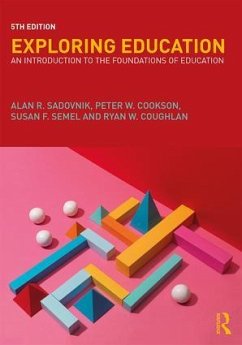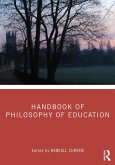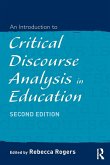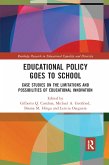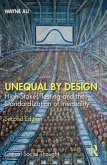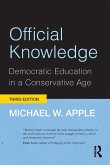Alan R. Sadovnik, Cookson, Jr., Peter, Susan Semel
Exploring Education
An Introduction to the Foundations of Education
Alan R. Sadovnik, Cookson, Jr., Peter, Susan Semel
Exploring Education
An Introduction to the Foundations of Education
- Broschiertes Buch
- Merkliste
- Auf die Merkliste
- Bewerten Bewerten
- Teilen
- Produkt teilen
- Produkterinnerung
- Produkterinnerung
This much-anticipated fifth edition of Exploring Education offers an alternative to traditional foundations texts by combining a point-of-view analysis with primary source readings. Pre- and in-service teachers will find a solid introduction to the foundations disciplines -- history, philosophy, politics, and sociology of education -- and their application to educational issues, including school organization and teaching, curriculum and pedagogic practices, education and inequality, and school reform and improvement. This edition features substantive updates, including additions to the…mehr
Andere Kunden interessierten sich auch für
![School Choice and the Impact of COVID-19 School Choice and the Impact of COVID-19]() Michael Guo-BrennanSchool Choice and the Impact of COVID-1942,99 €
Michael Guo-BrennanSchool Choice and the Impact of COVID-1942,99 €![The Critical Turn in Education The Critical Turn in Education]() Isaac GottesmanThe Critical Turn in Education46,99 €
Isaac GottesmanThe Critical Turn in Education46,99 €![Handbook of Philosophy of Education Handbook of Philosophy of Education]() Handbook of Philosophy of Education105,99 €
Handbook of Philosophy of Education105,99 €![An Introduction to Critical Discourse Analysis in Education An Introduction to Critical Discourse Analysis in Education]() An Introduction to Critical Discourse Analysis in Education55,99 €
An Introduction to Critical Discourse Analysis in Education55,99 €![Educational Policy Goes to School Educational Policy Goes to School]() Educational Policy Goes to School41,99 €
Educational Policy Goes to School41,99 €![Unequal By Design Unequal By Design]() Wayne AuUnequal By Design41,99 €
Wayne AuUnequal By Design41,99 €![Official Knowledge Official Knowledge]() Michael W. Apple (USA University of Wisconsin)Official Knowledge75,99 €
Michael W. Apple (USA University of Wisconsin)Official Knowledge75,99 €-
-
-
This much-anticipated fifth edition of Exploring Education offers an alternative to traditional foundations texts by combining a point-of-view analysis with primary source readings. Pre- and in-service teachers will find a solid introduction to the foundations disciplines -- history, philosophy, politics, and sociology of education -- and their application to educational issues, including school organization and teaching, curriculum and pedagogic practices, education and inequality, and school reform and improvement. This edition features substantive updates, including additions to the discussion of neo-liberal educational policy, recent debates about teacher diversity, updated data and research, and new selections of historical and contemporary readings.
At a time when foundations of education are marginalized in many teacher education programs and teacher education reform pushes scripted approaches to curriculum and instruction, Exploring Education helps teachers tothink critically about the "what" and "why" behind the most pressing issues in contemporary education.
At a time when foundations of education are marginalized in many teacher education programs and teacher education reform pushes scripted approaches to curriculum and instruction, Exploring Education helps teachers tothink critically about the "what" and "why" behind the most pressing issues in contemporary education.
Produktdetails
- Produktdetails
- Verlag: Routledge / Taylor & Francis
- 5. Aufl.
- Seitenzahl: 608
- Erscheinungstermin: 5. Oktober 2017
- Englisch
- Abmessung: 254mm x 178mm x 32mm
- Gewicht: 1177g
- ISBN-13: 9781138222168
- ISBN-10: 113822216X
- Artikelnr.: 49562735
- Herstellerkennzeichnung
- Libri GmbH
- Europaallee 1
- 36244 Bad Hersfeld
- gpsr@libri.de
- Verlag: Routledge / Taylor & Francis
- 5. Aufl.
- Seitenzahl: 608
- Erscheinungstermin: 5. Oktober 2017
- Englisch
- Abmessung: 254mm x 178mm x 32mm
- Gewicht: 1177g
- ISBN-13: 9781138222168
- ISBN-10: 113822216X
- Artikelnr.: 49562735
- Herstellerkennzeichnung
- Libri GmbH
- Europaallee 1
- 36244 Bad Hersfeld
- gpsr@libri.de
Alan R. Sadovnik is Board of Governors Distinguised Service Professor of Education, Sociology, and Public Administration and Affairs at Rutgers University-Newark, USA. Peter W. Cookson, Jr. is a Senior Researcher at the Learning Policy Institute Palo Alto California and Washington DC, and teaches in the Sociology Department at Georgetown University, USA. Susan F. Semel is Professor of Education at the City College of New York, USA and Professor of Urban Education at the City University of New York Graduate Center, USA. Ryan W. Coughlan is Assistant Professor of Sociology at Guttman Community College, CUNY, USA.
Contents
Preface
Acknowledgments
1 The Limits and Promises of Education: Toward Reflective Practitioners
Educational Problems
The Achievement Gaps
The Crisis in Urban Education
The Decline of Literacy
Assessment Issues
Understanding Education: The Foundations Perspective
The History of Education
The Philosophy of Education
The Politics of Education
The Sociology of Education
The Foundations Perspective: A Multidisciplinary and Interdisciplinary Approach
Critical Literacy and Empowerment: Toward the Active Voice of Teachers
2 The Politics of Education: Conservative, Liberal, Radical, and
Neo-liberal Perspectives
The Purposes of Schooling
Political Perspectives
General Issues: Conservative, Liberal, Radical, and Neo-liberal Perspectives
Traditional and Progressive Visions of Education
The Role of the School
Explanations of Unequal Educational Performance
Definition of Educational Problems
Educational Policy and Reform
Education and the American Dream
The Neo-liberal Perspective
From Political Perspectives to the Politics of Education
Evidence Use and the Core Curriculum Standards Movement: From Problem Definition to Policy Adoption, Lorraine McDonnell and M. Stephen Weatherford
What "Counts" as Educational Policy? Notes Toward a New Paradigm, Jean Anyon
3 The History of Education
Old World and New World Education: The Colonial Era
The Age of Reform: The Rise of the Common School
Opposition to Public Education
Education for Women and African-Americans
Urbanization and the Progressive Impetus
Education for All: The Emergence of the Public High School
The Post-World War II Equity Era: 1945-1980
Cycles of Reform: Progressive and Traditional
Equality of Opportunity
Educational Reaction and Reform and the Standards Era: 1980s-2012
Understanding the History of U.S. Education: Different Historical Interpretations
The Democratic-Liberal School
The Radical-Revisionist School
Conservative Perspectives
Conclusion
Empowerment and Education: Civil Rights, Expert Advocates, and Parent
Politics in Head Start, 1964-1980, Josh Kagan
Capital Accumulation, Class Conflict, and Educational Change, Samuel
Bowles and Herbert Gintis
4 The Sociology of Education
The Uses of Sociology for Teachers
The Relation between School and Society
Theoretical Perspectives
Functional Theories
Conflict Theories
Interactional Theories
Effects of Schooling on Individuals
Knowledge and Attitudes
Employment
Education and Mobility
Inside the Schools
Teacher Behavior
Student Peer Groups and Alienation
Education and Inequality
Inadequate Schools
Tracking
De Facto Segregation
Gender
Sociology and the Current Educational Crisis
The School Class as a Social System Some of Its Functions in
American Society, Talcott Parsons
On Understanding the Processes of Schooling: The Contributions of
Labeling Theory, Ray C. Rist
The Politics of Culture: Understanding Local Political Resistance to
Detracking in Racially Mixed Schools, Amy Stuart Wells and Irene Serna
5 The Philosophy of Education and Its Significance for Teachers
The Perspective of Philosophy of Education
What Is Philosophy of Education?
The Meaning of Philosophical Inquiry
Particular Philosophies of Education
Idealism
Realism
Pragmatism
Existentialism and Phenomenology
Neo-Marxism
Postmodernist and Critical Theory
Conclusion
My Pedagogic Creed, John Dewey
Wide-Awakeness and the Moral Life, Maxine Greene
6 Schools as Organizations and Teacher Professionalization
The Structure of U.S. Education
Governance
Size and Degree of Centralization
Student Composition
Degree of "Openness"
Private Schools
Conclusion
International Comparisons
Great Britain
France
Japan
Germany
Finland
Conclusion
School Processes and School Cultures
Teachers, Teaching, and Professionalization
Who Becomes a Teacher?
The Nature of Teaching
Underqualified Teachers
Teacher Professionalization
Rich Land, Poor Schools: Inequality of National Educational Resources
and Achievement of Disadvantaged Students, David Baker and Gerald LeTendre, with Brian Goesling
What Do the National Data Tell Us About Minority Teacher Shortages,
Richard Ingersoll
7 Curriculum, Pedagogy, and the Transmission of Knowledge
What Do the Schools Teach?
The History and Philosophy of the Curriculum
The Politics of the Curriculum
The Sociology of the Curriculum
Multicultural Education
Curriculum Theory and Practice: The Reconceptualization of Curriculum Studies
Pedagogic Practices: How the Curriculum is Taught
The Philosophy of Teaching: Differing Views on Pedagogic Practices
The Stratification of the Curriculum
The Effects of the Curriculum: What is Learned in Schools?
Conclusion
The Politics of a National Curriculum, Michael W. Apple
The Silenced Dialogue: Power and Pedagogy in Educating Other People's
Children, Lisa D. Delpit
8 Equality of Opportunity and Educational Outcomes
Calculating Educational and Life Outcomes
Class
Race
Gender
Educational Achievement and Attainment of African-American,
Hispanic-American, and Women Students
Students with Special Needs
Conclusion
School Differences and Educational Outcomes
The Coleman Study (1966)
The Coleman Study (1982)
Conclusion
School Segregation
Educational Attainment and Economic Achievement
Education and Inequality: Mobility or Reproduction?
Class and the Classroom: Even the Best Schools Can't Close the Race
Achievement Gap, Richard Rothstein
Fifty Years Since the Coleman Report: Rethinking the Relationship
between Schools and Inequality, Douglas B. Downey and Dennis J. Condron
A Social Constructionist Approach to Disability: Implications
for Special Education, Dimitris Anastasiou and James M. Kauffman
9 Explanations of Educational Inequality
Explanations of Unequal Educational Achievement
Student-Centered Explanations
Genetic Differences
Cultural Deprivation Theories
Cultural Difference Theories
School-Centered Explanations
School Financing
Effective School Research
Between-School Differences: Curriculum and Pedagogic Practices
Within-School Differences: Curriculum and Ability Grouping
Gender and Schooling
Do Schools Reproduce Inequality?
It's Not "a Black Thing": Understanding the Burden of Acting White and
Other Dilemmas of High Achievement, Karolyn Tyson, William Darity, Jr., and Domini R. Castellino
How You Bully a Girl": Sexual Drama and the Negotiation of
Gendered Sexuality in High School, Sarah A. Miller
The Rules of the Game and the Uncertain Transmission of
Advantage: Middle-class Parents' Search for an Urban
Kindergarten, Annette Lareau, Shani Adia Evans, and April Yee
A Black Student's Reflection on Public and Private Schools, Imani Perry
10 Educational Reform and School Improvement
Effective Teachers
Educational Reform from the 1980s to 2012
Federal Involvement in Education
Goals 2000: Building on a Decade of Reform
No Child Left Behind
Race to the Top
Approaches to Reform
School-Based Reforms
School Choice, Charter Schools, and Tuition Vouchers
Privatization
Teacher Education
Teacher Quality
The Effective School Movement
Societal, Community, Economic, and Political Reforms
State Intervention and Mayoral Control in Local School Districts
School Finance Reforms
Full Service and Community Schools
Harlem Children's Zone
Connecting School, Community, and Societal Reforms
A Theory of Educational Problems and Reforms
School Vouchers and Student Achievement: Reviewing the Research, David Trilling
A Critical Look at the Charter School Debate, Margaret E. Raymond
Ravitch-Tilson Debate, Diane Ravitch and Whitney Tilson
Appendix: Suggested Resources
Permissions
References
Index
Preface
Acknowledgments
1 The Limits and Promises of Education: Toward Reflective Practitioners
Educational Problems
The Achievement Gaps
The Crisis in Urban Education
The Decline of Literacy
Assessment Issues
Understanding Education: The Foundations Perspective
The History of Education
The Philosophy of Education
The Politics of Education
The Sociology of Education
The Foundations Perspective: A Multidisciplinary and Interdisciplinary Approach
Critical Literacy and Empowerment: Toward the Active Voice of Teachers
2 The Politics of Education: Conservative, Liberal, Radical, and
Neo-liberal Perspectives
The Purposes of Schooling
Political Perspectives
General Issues: Conservative, Liberal, Radical, and Neo-liberal Perspectives
Traditional and Progressive Visions of Education
The Role of the School
Explanations of Unequal Educational Performance
Definition of Educational Problems
Educational Policy and Reform
Education and the American Dream
The Neo-liberal Perspective
From Political Perspectives to the Politics of Education
Evidence Use and the Core Curriculum Standards Movement: From Problem Definition to Policy Adoption, Lorraine McDonnell and M. Stephen Weatherford
What "Counts" as Educational Policy? Notes Toward a New Paradigm, Jean Anyon
3 The History of Education
Old World and New World Education: The Colonial Era
The Age of Reform: The Rise of the Common School
Opposition to Public Education
Education for Women and African-Americans
Urbanization and the Progressive Impetus
Education for All: The Emergence of the Public High School
The Post-World War II Equity Era: 1945-1980
Cycles of Reform: Progressive and Traditional
Equality of Opportunity
Educational Reaction and Reform and the Standards Era: 1980s-2012
Understanding the History of U.S. Education: Different Historical Interpretations
The Democratic-Liberal School
The Radical-Revisionist School
Conservative Perspectives
Conclusion
Empowerment and Education: Civil Rights, Expert Advocates, and Parent
Politics in Head Start, 1964-1980, Josh Kagan
Capital Accumulation, Class Conflict, and Educational Change, Samuel
Bowles and Herbert Gintis
4 The Sociology of Education
The Uses of Sociology for Teachers
The Relation between School and Society
Theoretical Perspectives
Functional Theories
Conflict Theories
Interactional Theories
Effects of Schooling on Individuals
Knowledge and Attitudes
Employment
Education and Mobility
Inside the Schools
Teacher Behavior
Student Peer Groups and Alienation
Education and Inequality
Inadequate Schools
Tracking
De Facto Segregation
Gender
Sociology and the Current Educational Crisis
The School Class as a Social System Some of Its Functions in
American Society, Talcott Parsons
On Understanding the Processes of Schooling: The Contributions of
Labeling Theory, Ray C. Rist
The Politics of Culture: Understanding Local Political Resistance to
Detracking in Racially Mixed Schools, Amy Stuart Wells and Irene Serna
5 The Philosophy of Education and Its Significance for Teachers
The Perspective of Philosophy of Education
What Is Philosophy of Education?
The Meaning of Philosophical Inquiry
Particular Philosophies of Education
Idealism
Realism
Pragmatism
Existentialism and Phenomenology
Neo-Marxism
Postmodernist and Critical Theory
Conclusion
My Pedagogic Creed, John Dewey
Wide-Awakeness and the Moral Life, Maxine Greene
6 Schools as Organizations and Teacher Professionalization
The Structure of U.S. Education
Governance
Size and Degree of Centralization
Student Composition
Degree of "Openness"
Private Schools
Conclusion
International Comparisons
Great Britain
France
Japan
Germany
Finland
Conclusion
School Processes and School Cultures
Teachers, Teaching, and Professionalization
Who Becomes a Teacher?
The Nature of Teaching
Underqualified Teachers
Teacher Professionalization
Rich Land, Poor Schools: Inequality of National Educational Resources
and Achievement of Disadvantaged Students, David Baker and Gerald LeTendre, with Brian Goesling
What Do the National Data Tell Us About Minority Teacher Shortages,
Richard Ingersoll
7 Curriculum, Pedagogy, and the Transmission of Knowledge
What Do the Schools Teach?
The History and Philosophy of the Curriculum
The Politics of the Curriculum
The Sociology of the Curriculum
Multicultural Education
Curriculum Theory and Practice: The Reconceptualization of Curriculum Studies
Pedagogic Practices: How the Curriculum is Taught
The Philosophy of Teaching: Differing Views on Pedagogic Practices
The Stratification of the Curriculum
The Effects of the Curriculum: What is Learned in Schools?
Conclusion
The Politics of a National Curriculum, Michael W. Apple
The Silenced Dialogue: Power and Pedagogy in Educating Other People's
Children, Lisa D. Delpit
8 Equality of Opportunity and Educational Outcomes
Calculating Educational and Life Outcomes
Class
Race
Gender
Educational Achievement and Attainment of African-American,
Hispanic-American, and Women Students
Students with Special Needs
Conclusion
School Differences and Educational Outcomes
The Coleman Study (1966)
The Coleman Study (1982)
Conclusion
School Segregation
Educational Attainment and Economic Achievement
Education and Inequality: Mobility or Reproduction?
Class and the Classroom: Even the Best Schools Can't Close the Race
Achievement Gap, Richard Rothstein
Fifty Years Since the Coleman Report: Rethinking the Relationship
between Schools and Inequality, Douglas B. Downey and Dennis J. Condron
A Social Constructionist Approach to Disability: Implications
for Special Education, Dimitris Anastasiou and James M. Kauffman
9 Explanations of Educational Inequality
Explanations of Unequal Educational Achievement
Student-Centered Explanations
Genetic Differences
Cultural Deprivation Theories
Cultural Difference Theories
School-Centered Explanations
School Financing
Effective School Research
Between-School Differences: Curriculum and Pedagogic Practices
Within-School Differences: Curriculum and Ability Grouping
Gender and Schooling
Do Schools Reproduce Inequality?
It's Not "a Black Thing": Understanding the Burden of Acting White and
Other Dilemmas of High Achievement, Karolyn Tyson, William Darity, Jr., and Domini R. Castellino
How You Bully a Girl": Sexual Drama and the Negotiation of
Gendered Sexuality in High School, Sarah A. Miller
The Rules of the Game and the Uncertain Transmission of
Advantage: Middle-class Parents' Search for an Urban
Kindergarten, Annette Lareau, Shani Adia Evans, and April Yee
A Black Student's Reflection on Public and Private Schools, Imani Perry
10 Educational Reform and School Improvement
Effective Teachers
Educational Reform from the 1980s to 2012
Federal Involvement in Education
Goals 2000: Building on a Decade of Reform
No Child Left Behind
Race to the Top
Approaches to Reform
School-Based Reforms
School Choice, Charter Schools, and Tuition Vouchers
Privatization
Teacher Education
Teacher Quality
The Effective School Movement
Societal, Community, Economic, and Political Reforms
State Intervention and Mayoral Control in Local School Districts
School Finance Reforms
Full Service and Community Schools
Harlem Children's Zone
Connecting School, Community, and Societal Reforms
A Theory of Educational Problems and Reforms
School Vouchers and Student Achievement: Reviewing the Research, David Trilling
A Critical Look at the Charter School Debate, Margaret E. Raymond
Ravitch-Tilson Debate, Diane Ravitch and Whitney Tilson
Appendix: Suggested Resources
Permissions
References
Index
Contents
Preface
Acknowledgments
1 The Limits and Promises of Education: Toward Reflective Practitioners
Educational Problems
The Achievement Gaps
The Crisis in Urban Education
The Decline of Literacy
Assessment Issues
Understanding Education: The Foundations Perspective
The History of Education
The Philosophy of Education
The Politics of Education
The Sociology of Education
The Foundations Perspective: A Multidisciplinary and Interdisciplinary Approach
Critical Literacy and Empowerment: Toward the Active Voice of Teachers
2 The Politics of Education: Conservative, Liberal, Radical, and
Neo-liberal Perspectives
The Purposes of Schooling
Political Perspectives
General Issues: Conservative, Liberal, Radical, and Neo-liberal Perspectives
Traditional and Progressive Visions of Education
The Role of the School
Explanations of Unequal Educational Performance
Definition of Educational Problems
Educational Policy and Reform
Education and the American Dream
The Neo-liberal Perspective
From Political Perspectives to the Politics of Education
Evidence Use and the Core Curriculum Standards Movement: From Problem Definition to Policy Adoption, Lorraine McDonnell and M. Stephen Weatherford
What "Counts" as Educational Policy? Notes Toward a New Paradigm, Jean Anyon
3 The History of Education
Old World and New World Education: The Colonial Era
The Age of Reform: The Rise of the Common School
Opposition to Public Education
Education for Women and African-Americans
Urbanization and the Progressive Impetus
Education for All: The Emergence of the Public High School
The Post-World War II Equity Era: 1945-1980
Cycles of Reform: Progressive and Traditional
Equality of Opportunity
Educational Reaction and Reform and the Standards Era: 1980s-2012
Understanding the History of U.S. Education: Different Historical Interpretations
The Democratic-Liberal School
The Radical-Revisionist School
Conservative Perspectives
Conclusion
Empowerment and Education: Civil Rights, Expert Advocates, and Parent
Politics in Head Start, 1964-1980, Josh Kagan
Capital Accumulation, Class Conflict, and Educational Change, Samuel
Bowles and Herbert Gintis
4 The Sociology of Education
The Uses of Sociology for Teachers
The Relation between School and Society
Theoretical Perspectives
Functional Theories
Conflict Theories
Interactional Theories
Effects of Schooling on Individuals
Knowledge and Attitudes
Employment
Education and Mobility
Inside the Schools
Teacher Behavior
Student Peer Groups and Alienation
Education and Inequality
Inadequate Schools
Tracking
De Facto Segregation
Gender
Sociology and the Current Educational Crisis
The School Class as a Social System Some of Its Functions in
American Society, Talcott Parsons
On Understanding the Processes of Schooling: The Contributions of
Labeling Theory, Ray C. Rist
The Politics of Culture: Understanding Local Political Resistance to
Detracking in Racially Mixed Schools, Amy Stuart Wells and Irene Serna
5 The Philosophy of Education and Its Significance for Teachers
The Perspective of Philosophy of Education
What Is Philosophy of Education?
The Meaning of Philosophical Inquiry
Particular Philosophies of Education
Idealism
Realism
Pragmatism
Existentialism and Phenomenology
Neo-Marxism
Postmodernist and Critical Theory
Conclusion
My Pedagogic Creed, John Dewey
Wide-Awakeness and the Moral Life, Maxine Greene
6 Schools as Organizations and Teacher Professionalization
The Structure of U.S. Education
Governance
Size and Degree of Centralization
Student Composition
Degree of "Openness"
Private Schools
Conclusion
International Comparisons
Great Britain
France
Japan
Germany
Finland
Conclusion
School Processes and School Cultures
Teachers, Teaching, and Professionalization
Who Becomes a Teacher?
The Nature of Teaching
Underqualified Teachers
Teacher Professionalization
Rich Land, Poor Schools: Inequality of National Educational Resources
and Achievement of Disadvantaged Students, David Baker and Gerald LeTendre, with Brian Goesling
What Do the National Data Tell Us About Minority Teacher Shortages,
Richard Ingersoll
7 Curriculum, Pedagogy, and the Transmission of Knowledge
What Do the Schools Teach?
The History and Philosophy of the Curriculum
The Politics of the Curriculum
The Sociology of the Curriculum
Multicultural Education
Curriculum Theory and Practice: The Reconceptualization of Curriculum Studies
Pedagogic Practices: How the Curriculum is Taught
The Philosophy of Teaching: Differing Views on Pedagogic Practices
The Stratification of the Curriculum
The Effects of the Curriculum: What is Learned in Schools?
Conclusion
The Politics of a National Curriculum, Michael W. Apple
The Silenced Dialogue: Power and Pedagogy in Educating Other People's
Children, Lisa D. Delpit
8 Equality of Opportunity and Educational Outcomes
Calculating Educational and Life Outcomes
Class
Race
Gender
Educational Achievement and Attainment of African-American,
Hispanic-American, and Women Students
Students with Special Needs
Conclusion
School Differences and Educational Outcomes
The Coleman Study (1966)
The Coleman Study (1982)
Conclusion
School Segregation
Educational Attainment and Economic Achievement
Education and Inequality: Mobility or Reproduction?
Class and the Classroom: Even the Best Schools Can't Close the Race
Achievement Gap, Richard Rothstein
Fifty Years Since the Coleman Report: Rethinking the Relationship
between Schools and Inequality, Douglas B. Downey and Dennis J. Condron
A Social Constructionist Approach to Disability: Implications
for Special Education, Dimitris Anastasiou and James M. Kauffman
9 Explanations of Educational Inequality
Explanations of Unequal Educational Achievement
Student-Centered Explanations
Genetic Differences
Cultural Deprivation Theories
Cultural Difference Theories
School-Centered Explanations
School Financing
Effective School Research
Between-School Differences: Curriculum and Pedagogic Practices
Within-School Differences: Curriculum and Ability Grouping
Gender and Schooling
Do Schools Reproduce Inequality?
It's Not "a Black Thing": Understanding the Burden of Acting White and
Other Dilemmas of High Achievement, Karolyn Tyson, William Darity, Jr., and Domini R. Castellino
How You Bully a Girl": Sexual Drama and the Negotiation of
Gendered Sexuality in High School, Sarah A. Miller
The Rules of the Game and the Uncertain Transmission of
Advantage: Middle-class Parents' Search for an Urban
Kindergarten, Annette Lareau, Shani Adia Evans, and April Yee
A Black Student's Reflection on Public and Private Schools, Imani Perry
10 Educational Reform and School Improvement
Effective Teachers
Educational Reform from the 1980s to 2012
Federal Involvement in Education
Goals 2000: Building on a Decade of Reform
No Child Left Behind
Race to the Top
Approaches to Reform
School-Based Reforms
School Choice, Charter Schools, and Tuition Vouchers
Privatization
Teacher Education
Teacher Quality
The Effective School Movement
Societal, Community, Economic, and Political Reforms
State Intervention and Mayoral Control in Local School Districts
School Finance Reforms
Full Service and Community Schools
Harlem Children's Zone
Connecting School, Community, and Societal Reforms
A Theory of Educational Problems and Reforms
School Vouchers and Student Achievement: Reviewing the Research, David Trilling
A Critical Look at the Charter School Debate, Margaret E. Raymond
Ravitch-Tilson Debate, Diane Ravitch and Whitney Tilson
Appendix: Suggested Resources
Permissions
References
Index
Preface
Acknowledgments
1 The Limits and Promises of Education: Toward Reflective Practitioners
Educational Problems
The Achievement Gaps
The Crisis in Urban Education
The Decline of Literacy
Assessment Issues
Understanding Education: The Foundations Perspective
The History of Education
The Philosophy of Education
The Politics of Education
The Sociology of Education
The Foundations Perspective: A Multidisciplinary and Interdisciplinary Approach
Critical Literacy and Empowerment: Toward the Active Voice of Teachers
2 The Politics of Education: Conservative, Liberal, Radical, and
Neo-liberal Perspectives
The Purposes of Schooling
Political Perspectives
General Issues: Conservative, Liberal, Radical, and Neo-liberal Perspectives
Traditional and Progressive Visions of Education
The Role of the School
Explanations of Unequal Educational Performance
Definition of Educational Problems
Educational Policy and Reform
Education and the American Dream
The Neo-liberal Perspective
From Political Perspectives to the Politics of Education
Evidence Use and the Core Curriculum Standards Movement: From Problem Definition to Policy Adoption, Lorraine McDonnell and M. Stephen Weatherford
What "Counts" as Educational Policy? Notes Toward a New Paradigm, Jean Anyon
3 The History of Education
Old World and New World Education: The Colonial Era
The Age of Reform: The Rise of the Common School
Opposition to Public Education
Education for Women and African-Americans
Urbanization and the Progressive Impetus
Education for All: The Emergence of the Public High School
The Post-World War II Equity Era: 1945-1980
Cycles of Reform: Progressive and Traditional
Equality of Opportunity
Educational Reaction and Reform and the Standards Era: 1980s-2012
Understanding the History of U.S. Education: Different Historical Interpretations
The Democratic-Liberal School
The Radical-Revisionist School
Conservative Perspectives
Conclusion
Empowerment and Education: Civil Rights, Expert Advocates, and Parent
Politics in Head Start, 1964-1980, Josh Kagan
Capital Accumulation, Class Conflict, and Educational Change, Samuel
Bowles and Herbert Gintis
4 The Sociology of Education
The Uses of Sociology for Teachers
The Relation between School and Society
Theoretical Perspectives
Functional Theories
Conflict Theories
Interactional Theories
Effects of Schooling on Individuals
Knowledge and Attitudes
Employment
Education and Mobility
Inside the Schools
Teacher Behavior
Student Peer Groups and Alienation
Education and Inequality
Inadequate Schools
Tracking
De Facto Segregation
Gender
Sociology and the Current Educational Crisis
The School Class as a Social System Some of Its Functions in
American Society, Talcott Parsons
On Understanding the Processes of Schooling: The Contributions of
Labeling Theory, Ray C. Rist
The Politics of Culture: Understanding Local Political Resistance to
Detracking in Racially Mixed Schools, Amy Stuart Wells and Irene Serna
5 The Philosophy of Education and Its Significance for Teachers
The Perspective of Philosophy of Education
What Is Philosophy of Education?
The Meaning of Philosophical Inquiry
Particular Philosophies of Education
Idealism
Realism
Pragmatism
Existentialism and Phenomenology
Neo-Marxism
Postmodernist and Critical Theory
Conclusion
My Pedagogic Creed, John Dewey
Wide-Awakeness and the Moral Life, Maxine Greene
6 Schools as Organizations and Teacher Professionalization
The Structure of U.S. Education
Governance
Size and Degree of Centralization
Student Composition
Degree of "Openness"
Private Schools
Conclusion
International Comparisons
Great Britain
France
Japan
Germany
Finland
Conclusion
School Processes and School Cultures
Teachers, Teaching, and Professionalization
Who Becomes a Teacher?
The Nature of Teaching
Underqualified Teachers
Teacher Professionalization
Rich Land, Poor Schools: Inequality of National Educational Resources
and Achievement of Disadvantaged Students, David Baker and Gerald LeTendre, with Brian Goesling
What Do the National Data Tell Us About Minority Teacher Shortages,
Richard Ingersoll
7 Curriculum, Pedagogy, and the Transmission of Knowledge
What Do the Schools Teach?
The History and Philosophy of the Curriculum
The Politics of the Curriculum
The Sociology of the Curriculum
Multicultural Education
Curriculum Theory and Practice: The Reconceptualization of Curriculum Studies
Pedagogic Practices: How the Curriculum is Taught
The Philosophy of Teaching: Differing Views on Pedagogic Practices
The Stratification of the Curriculum
The Effects of the Curriculum: What is Learned in Schools?
Conclusion
The Politics of a National Curriculum, Michael W. Apple
The Silenced Dialogue: Power and Pedagogy in Educating Other People's
Children, Lisa D. Delpit
8 Equality of Opportunity and Educational Outcomes
Calculating Educational and Life Outcomes
Class
Race
Gender
Educational Achievement and Attainment of African-American,
Hispanic-American, and Women Students
Students with Special Needs
Conclusion
School Differences and Educational Outcomes
The Coleman Study (1966)
The Coleman Study (1982)
Conclusion
School Segregation
Educational Attainment and Economic Achievement
Education and Inequality: Mobility or Reproduction?
Class and the Classroom: Even the Best Schools Can't Close the Race
Achievement Gap, Richard Rothstein
Fifty Years Since the Coleman Report: Rethinking the Relationship
between Schools and Inequality, Douglas B. Downey and Dennis J. Condron
A Social Constructionist Approach to Disability: Implications
for Special Education, Dimitris Anastasiou and James M. Kauffman
9 Explanations of Educational Inequality
Explanations of Unequal Educational Achievement
Student-Centered Explanations
Genetic Differences
Cultural Deprivation Theories
Cultural Difference Theories
School-Centered Explanations
School Financing
Effective School Research
Between-School Differences: Curriculum and Pedagogic Practices
Within-School Differences: Curriculum and Ability Grouping
Gender and Schooling
Do Schools Reproduce Inequality?
It's Not "a Black Thing": Understanding the Burden of Acting White and
Other Dilemmas of High Achievement, Karolyn Tyson, William Darity, Jr., and Domini R. Castellino
How You Bully a Girl": Sexual Drama and the Negotiation of
Gendered Sexuality in High School, Sarah A. Miller
The Rules of the Game and the Uncertain Transmission of
Advantage: Middle-class Parents' Search for an Urban
Kindergarten, Annette Lareau, Shani Adia Evans, and April Yee
A Black Student's Reflection on Public and Private Schools, Imani Perry
10 Educational Reform and School Improvement
Effective Teachers
Educational Reform from the 1980s to 2012
Federal Involvement in Education
Goals 2000: Building on a Decade of Reform
No Child Left Behind
Race to the Top
Approaches to Reform
School-Based Reforms
School Choice, Charter Schools, and Tuition Vouchers
Privatization
Teacher Education
Teacher Quality
The Effective School Movement
Societal, Community, Economic, and Political Reforms
State Intervention and Mayoral Control in Local School Districts
School Finance Reforms
Full Service and Community Schools
Harlem Children's Zone
Connecting School, Community, and Societal Reforms
A Theory of Educational Problems and Reforms
School Vouchers and Student Achievement: Reviewing the Research, David Trilling
A Critical Look at the Charter School Debate, Margaret E. Raymond
Ravitch-Tilson Debate, Diane Ravitch and Whitney Tilson
Appendix: Suggested Resources
Permissions
References
Index

